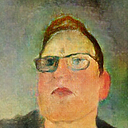From Why I Write (1946):
Every line of serious work that I have written since 1936 has been written, directly or indirectly, against totalitarianism and for democratic socialism, as I understand it.
This written immediately after Animal Farm and three years before 1984 was released, which is to say it’s an absolutely unambiguous statement about Orwell’s intention when he was writing 1984.
The passage you quote is written from the perspective of Emmanuel Goldstein, who is expressing his disillusionment with the development of socialism in the 20th century. There’s almost universal consensus among literary critics that Emmanuel Goldstein is based on Leon Trotsky, since Orwell was sympathetic with Trotskyism his whole life. He fought with the POUM, Trotskyite Spanish militia, and published regularly in the Trotskyist newspaper Partisan Review.
Orwell drew a distinction between totalitarian socialism, i.e. Stalinism, and a more participatory, democratic variety. To the extent that those books are anti-communist, the critique is coming from the left. Orwell was far more radical than Vonnegut.
Along with Tom Wintringham, Orwell was trying to organize Home Guard as a revolutionary people’s militia with the aim of overthrowing the Colonel Blimps, necrotic and inept British ruling classes—something Orwell thought was absolute necessary in order to win the war against the Nazis.
In the Lion and the Unicorn, writing under Nazi bombardment, Orwell argued that the only solution was class war.
An army of unemployed led by millionaires quoting the Sermon on the Mount — that is our danger. But it cannot arise when we have once introduced a reasonable degree of social justice. The lady in the Rolls-Royce car is more damaging to morale than a fleet of Goering’s bombing planes.
